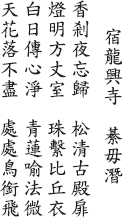66

Ch’i-wu Ch’ien (692–749) was from the Yangtze city of Chiangling and served in Ch’ang-an as a censor and later as editorial director of the Palace Library. He was known for his well-crafted poems but better known for those written to him by others. Some commentators say this temple was 100 kilometers southwest of Chiangling near Lingling; others say it was 300 kilometers northeast near Fanghsien. Trees are planted outside a temple’s main gate as guardians of the serenity within. The lamp of wisdom lights the abbot’s chamber, where he gives personal instruction. Strands of beads are used for keeping track of repetitions of the Buddha’s name, but a single bead was sometimes used to fasten a monk’s robe. In any case, their simplicity contrasts with the attire of officials. The lotus represents the transcendent teaching of the Buddha that remains rooted in the mud of this world. In the Vimalakirti Sutra: 7, a celestial deity showers flowers on those who cultivate the Dharma. But the petals don’t cling to those who are detached from their practice.
Spending the Night at Lunghsing Temple
CH’I-WU CH’IEN
I failed to leave the temple by dark
pine trees cooled the shrine-hall gate
a lamp illumined the abbot’s chamber
beads held monastic robes together
the white sun taught the purity of mind
a blue lotus showed the subtlety of truth
heavenly petals fell without cease
everywhere birds carried them off